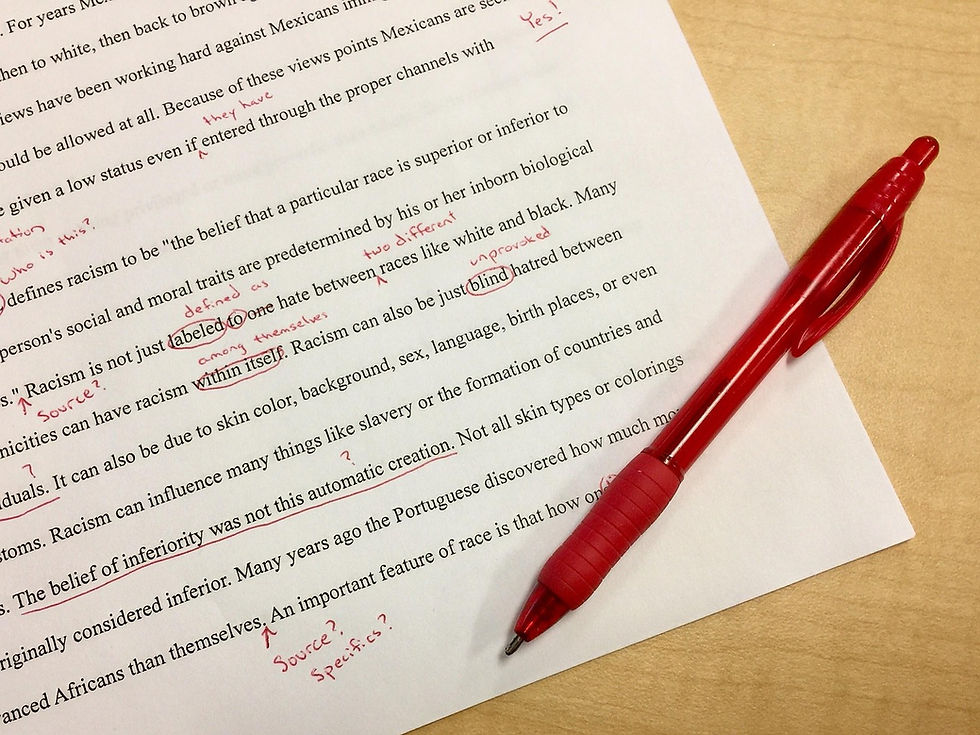Why beta readers are important, and where to find them
- Rhian MacGillivray
- Nov 18, 2025
- 6 min read
Updated: Nov 28, 2025

In today’s blog post (which has been a long time coming – life has been busy and the blog has been neglected!), I thought I’d talk about beta readers and their importance in helping writers improve their craft.
I’ve worked with beta readers in the past, but more recently I’ve found myself a wonderful group of beta readers. We chat daily on a Discord server and we swap manuscripts and feedback continuously, with a monthly video call to talk about our work, feedback and brainstorm.
So let’s jump into it!
What is a beta reader?

If you’re new to writing, or you’re coming at this from more of a reader’s perspective and you’re looking to learn about how authors write novels, you might be wondering what is a beta reader?
I’ve seen the terms "beta reader" and "critique partner" used interchangeably, or used with subtle differences, but for this blog post I’ll lay out what my squad of beta readers do: they are a combination of both.
My squad are readers of the genre I’m writing in (beta readers), but they are also writers who exchange feedback with me regularly (critique partners). They cover reader aspects, such as the emotional impact of scenes, overall engagement, and character likeability or believability, in addition to writing craft-level feedback, such as grammar, line-level suggestions, and plot and character development.
What good beta readers do

The main thing beta readers should do for you as a writer sharing your work with them is to give you criticism that’s honest but constructive.
They’ll be able to give a “zoomed out” view, which is often difficult for a writer to do with their own writing. That means they’ll spot problems with pacing (does any part of your book lag or feel slow, or lacking tension), signal any parts that are unclear, and pick apart any plot holes lurking in your work.
A good beta reader should also be able to tell you what does work in your manuscript, so you know your strengths and know which parts of your story you simply must keep.
Mine have been invaluable in pulling apart my latest manuscript, and brainstorming ideas with me too. More than anything, they’ve been supportive and understanding of the writing process.
Good beta readers will help you make your story better, as well as support you in becoming a better writer.
Finding beta readers

So, you’ve decided you want to find beta readers. That’s great! But… where do you find beta readers?
There are plenty places you can use to find beta readers or critique partners for your story, both online and in-person.
In the online world, there are many online writing communities out there that you could join, whether free or unpaid (that decision is up to you).
Social media is also another fantastic way to find people writing or reading in your genre. Just make sure you research anyone offering to read your novel to make sure their intentions are genuine.
There are also websites that “match” beta readers, and these can be really useful.
If in-person is more your thing, you can find beta readers at writing retreats or local writing groups. You simply need to find your people!
To tell you a little about my own experiences, I’ve used two of these methods.
The first was connecting with other writers in my genres on X/Twitter, and simply building up a rapport before swapping manuscripts for feedback. The feedback I gained was good, and definitely improved the manuscripts I was working on.
The second option, and the one that’s led to my current beta reader group of writers that looks like it will last for some time to come, was a match-up website. I used Bianca Marais’ beta reader match-up service, so I was matched with four other lovely writers in my genre after paying a small fee. We exchanged the first 3,000 words of our work, and since then, we’ve exchanged many more words! For me, the $25 fee was worth it to find writers who are genuinely interested in forming long-term beta reading partnerships.
I paid for the match-up service, not the beta reading part. My betas do that for free. You absolutely do not need to pay someone to beta read for you. There are plenty of people who will do so for free, or in exchange for you reading their manuscript in return.
Tips when working with beta readers

In my personal experience, having several pairs of eyes on your manuscript is incredibly useful, which is why I’d recommend finding 2-4 beta readers.
The reason for this is every beta reader will read your manuscript in a slightly different way. They may spot things others won’t, which might prove interesting to you, or if they overlap in their comments with your other beta readers, then you know their criticism or praise is well-founded.
When sending your work to your beta readers, be clear in your communication and state when you hope to hear back from them.
In addition, if there are specific questions you’d like them to bear in mind while reading, mention them! Write them down in your manuscript document itself, in the email you send to them, or in a separate document. This will help them target their feedback if there’s something specific in your manuscript that has you worried, or that you’d like more opinions on.
Questions might include: Did you notice any plot holes? Were any parts of this unclear to you? Which characters did you empathise with most?
If you want to get more specific with beta readers who are also writers, you could ask: What did you think of this character’s development? Is there enough tension in this scene?
How to evaluate feedback

Whenever you receive beta reader feedback, I think it’s important to let yourself absorb the feedback for a few days before diving right into making changes. Your mind will be subconsciously working through their points and classifying the main ones, the key ones, the problematic ones. Make sure you take the time to focus on the positive feedback they give you too! This will serve as the perfect motivation to dive into revisions.
As useful as beta readers are, it’s also important to know when you should take or leave their feedback. At the end of the day, this is your book, and they don’t necessarily know your characters and the story as well as you do.
It’s a case of considering their feedback and identifying the real problems in your novel. For example, if multiple beta readers point out the same plot hole/character issue/lack of tension in a scene, then there’s probably a genuine problem there that’s worth fixing (this is why having multiple beta readers is useful!). Identify the problem behind the suggestions or aspects they’re highlighting.
You have to be able to work out which comments and feedback are a matter of personal taste. Some feedback may be a case of what that person would do if they were writing the story, and it might take your novel in a direction you don’t want. So don’t be afraid to ignore some pieces of advice.
Another aspect to take into account is each of your beta reader’s strengths. I was talking about this with my squad this weekend, and we all agree that we each have different beta reader hats: one is better at flagging aspects related to interiority, one is better at characterisation-related topics, and so on. If you work with the same beta readers long-term, you’ll get to know what each one has to offer, and whose advice to trust most on each area of writing a novel.
And remember, you don’t have to accept or implement every suggestion your beta readers make. You are the author of this book, so you have the final say on how it gets written.

So, I hope I’ve convinced you on the merits of beta readers, and their importance in the writing process, both in terms of the novel you’re working on and your own growth as a writer. Stay tuned for my next blog post, where I’ll outline how you can be a good beta reader or critique partner.
If you haven’t already, why not sign up for my updates and monthly newsletter? Simply fill in the form at the bottom of the page.
Make sure you follow my writing and agenting social media accounts on X (@RhiMacG and @Rhian_at_Birch), Instagram (@rhian_writes and @rhian_at_birch) and Goodreads.
And if you haven’t got yourself a copy of The Cards We’re Dealt yet, head to my Books section and pick your preferred marketplace.
Thanks, and see you soon!



Comments